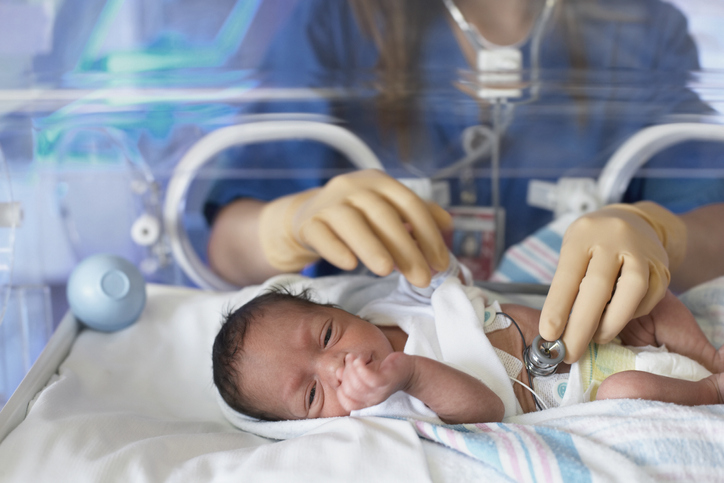Hemolytic disease of the fetus and newborn (HDFN) is associated with the rapid breakdown of a baby’s red blood cells (RBCs). Treatment often includes blood transfusions for an infant, which a parent may accept or deny, depending on their own personal beliefs related to their religion or culture.
What is HDFN?
Hemolytic disease of the fetus and newborn (HDFN) is an immune-mediated red blood cell (RBC) disorder that occurs when a baby’s RBCs break down quickly, which is called hemolysis. HDFN is caused by a mismatch between a mother’s and her baby’s blood type (A, B, AB, or O) or Rhesus (Rh) factor (Rh-positive or Rh-negative) during pregnancy. Numerous antibodies to RBC antigens can be linked to HDFN, such as those from the ABO and Rh blood group systems.
Many antibodies to RBC antigens can be linked to HDFN, including those from the ABO and Rh blood group systems. At times, a protein known as the Rh(D) antigen may be detected as well.
HDFN may be identified during pregnancy or following a baby’s birth. Initiating treatment early is key to the prevention of serious outcomes, such as fetal anemia; hydrops fetalis (swelling of the liver, spleen or heart; neonatal jaundice or hyperbilirubinemia (yellow coloring of the skin/whites of the eyes; and even death.
How is the Rh factor inherited?
The Rh factor is passed from a parent to a child through their genes. In fact, a baby can inherit the Rh factor from the mother or the father.
Most people are Rh-positive. This means they have inherited the Rh factor from their mother or their father. When the Rh factor is not inherited, the baby is then Rh-negative.
An RhD-negative blood type is found only in a fetus that has not inherited any copies of the RhD antigen from either of its biologic parents. When the mother is Rh-negative and her baby is Rh-positive, this is called Rh incompatibility.
Normally, Rh sensitization does not present an issue in a woman’s first pregnancy. In all future pregnancies, however, HDFN may cause problems.
Read more about the HDFN treatment
How is HDFN diagnosed in an unborn baby?
Prior to a baby’s birth, certain tests can be performed to check for the presence of HDFN, if suspected. These include the following:
- Blood tests, to confirm whether a mother has any antibodies against the fetus’s RBCs
- Ultrasound, to evaluate the fetus’s organs for any possible enlargement
- Amniocentesis, to remove amniotic fluid from the mothers uterus to screen for any genetic abnormalities
How is HDFN treated following the birth of a baby?
Treatment of HDFN must encompass a multidisciplinary approach, in which the expertise of various specialties will be called upon. Phototherapy, administration of Rh immunoglobulin (RhIg) intramuscularly or intravenously, exchange transfusions and intrauterine transfusions (IUTs) may be used.
Among neonates with HDFN, phototherapy is used to treat hyperbilirubinemia. When alloimmunization is reported, in which there is an immune response to foreign antigens, it typically is treated with RHIg.
When exchange transfusions are used, some of the newborn’s blood, which has a high level of bilirubin, is removed and replaced with blood that has a normal bilirubin concentration. When IUT is utilized, RBCs from a donor are injected into the fetus.
Transfusions and religious/cultural considerations
Some patients may decline to receive a transfusion for religious, cultural, or personal reasons. Certain individuals may have beliefs that prohibit the transfusion of blood components and/or fractionated products (also known as plasma derivatives). Such wishes and beliefs must be respected, such that all patients are treated in a logical, non-emotional manner.
Although some individuals will decline receiving all types of blood transfusions, some will accept the transfusion of fractionated blood products. Other individuals will accept autologous blood collection/ transfusion, cell salvage and the auto-transfusion of blood that is obtained during a surgical procedure.
A right to refuse treatment
Whenever a parent refuses to permit a transfusion for their child, a confidential discussion should be conducted between the parent and their medical team to understand exactly what will and will not be accepted by the parent.
In those situations in which parents or guardians refuse to provide their consent for a transfusion that is considered necessary to save a life, avoid permanent injury or prevent prolonged/avoidable pain and suffering, consultation with the appropriate medical and legal individuals should take place.

